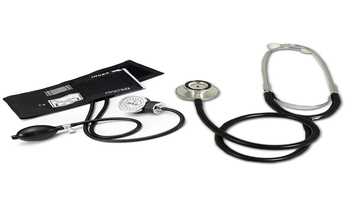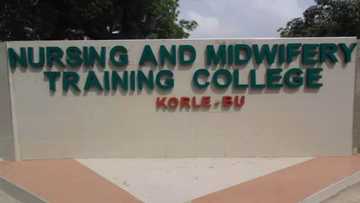Who is a nurse: types, roles and careers in Ghana
The roles and scope of nursing as a practice are dynamic. As a nurse gets more qualifications and experiences, this helps them land senior roles and in turn get a better salary. To better their career, these health professionals have the option to specialize in a range of fields. While there are over 30 different types of nursing careers, the definition of who is a nurse and the role they play in a patient’s life remains the same. However, the different nursing specialties available mean that nurses can take up more responsibilities that were previously restricted to physicians. Read on to know more about the definition of the nursing profession, different types of nursing jobs, and the roles of this caregiver.

Source: Facebook
By specializing in a specific niche, a nurse becomes an expert in the field which in turn leads to career advancement. Therefore, a strong educational background is a must for anyone who wishes to have a fulfilling and well-paying career in this field. Before we delve into the different types of nurse careers and their roles, anyone who wants to become a nurse practitioner must first understand who is a registered nurse.

Read also
Ghanaian nurse delights as he relocates to the US, urges his colleagues to join him, video trends
Who is a nurse?
A nurse is a health professional who is trained and certified to give care to patients. Just like other medics, nurses can choose where they want to work and the type of work they want to do by specializing in a preferred field. A nurse is differentiated from other health professions by their scope of practice and approach to patient care. The general role of a nurse is to liaise with physicians, the patient, and the patient's family and create a plan of care that improves the quality of life for anyone who is ailing. The great part about a nursing career is that nurses can work both independently and interdependently.
While there are more than 50 nursing careers, the role and duties that a nurse might perform will depend on the area of specialty. For example, a nurse with a Master’s degree tends to get managerial or supervisory roles while those with a diploma or degree get roles that deal with the patient-care aspect of nursing. Regardless of which specialty you choose, for a nurse to practice nursing legally, they must have the right certificates and credentials.
Types of nursing specialty and their roles

Source: Facebook
Here are the different types of nursing specialties:
1. Nurse-midwife
This type of nurse practitioner coordinates cares for expectant mothers, helps in delivering, and provides aftercare for both the child and the mother. To be a certified nurse-midwife, you need to have a master's degree and extensive experience in neonatal care, prenatal care, as well as labour and delivery.
2. Clinical nurse
A clinical nurse is an advanced practice registered nurse who provides specialized care for patients who are chronically ill. These nurses also help in the diagnosis and treatment of chronic diseases that require specific care like cancer and heart diseases. To become a clinical nurse, you need a bachelor's or a master's degree.
3. Registered Nurse (RN)
These nurses can specialize in several medical field sectors because they perform various tasks related to patient care. Some of their top roles include assisting a physician, educating the patient on disease prevention, and providing services that promote health. To be a registered nurse, you need to have a professional nursing associate degree.
4. Nursing research
It is impossible to look at the list of nursing fields and not find nursing research. These types of nurse practitioners conduct scientific research related to illnesses and health so that they can ensure the well being of a patient and in order to improve health care services. Data collection and analysis, grant writing, presenting findings, and enrolling patients in research studies are some of the duties of a registered nurse in this field.
Research nurses jobs tend to be in pharmaceutical companies, research laboratories, medical research organizations, and universities. If you are wondering about what it takes to be a nurse in this field, then you first need to have an advanced nursing degree, RN license, and you need to get specialized training in areas such as informatics.
5. Licensed Practical Nurse (LPN)
LPN perform their roles under the supervision of a registered nurse. To become an LPN, you need a practical nursing diploma. Some of the duties of a licensed practical nurse include administering injections, checking vital signs, and giving medicines.

Source: Original
6. Oncology nurse
An oncology nurse works one on one with cancer patients. The roles of the nurses in this career include administering chemotherapy, monitoring the progress of the patient, and implementing various cancer treatments. To become an oncology nurse, you need a bachelor's degree and other relevant credentials.
7. Intensive Care Unit (ICU) registered nurse
Also called critical care nurses, these healthcare professionals cater to patients who are in ICU. Because of how sensitive the ICU is, most hospitals require these nurses to have a bachelor of science degree in nursing.
8. Neonatal nursing
Neonatal nursing provides care for newborn infants with medical problems such as cardiac malfunctions, birth defects, and those arising from premature birth. Because of the special care these babies need to survive, these nurses are often tasked with ensuring the well-being of a newborn from the time they are born until they get discharged.
9. Orthopaedic nurse
The nurses with this specialty provide care to patients who suffer from musculoskeletal problems such as fractures and arthritis. Orthopaedic nurses roles are to assess musculoskeletal issues and prepare a treatment plan. These types of nurse practitioners also help patients to recover their strength and mobility as well as assist orthopaedic doctors with operations.
10. Emergency room nurse

Source: Original
If you love and can handle a high-stress job environment, then becoming an emergency room nurse can be your ideal career choice. The role of a nurse in this field is to treat and help stabilize patients experiencing trauma or injuries. They mostly do their jobs in the hospital ER.
While an AD or BSN can help you get a job as an ER nurse, going further and getting various credentials will demonstrate your extensive expertise, skills, and knowledge.
11. Operating room nurse
Operating room nurses, also referred to as scrub nurses or perioperative nurses, have a significant role in providing quality care for patients before, during, and after surgery. They also equip patients with post-operative care. Since these nurses work alongside surgeons, the minimum education level required is an ADN or BSN, but you also need a Certified Nurse Operating Room (CNOR) certificate to show commitment to the highest standards of patient care.
12. Psychiatric nurse
A certified nurse with this specialty provides care for patients with mental issues and psychiatric disorders like depression and schizophrenia. These nurses also have extensive knowledge of behavioural therapy which allows them to teach the patient's family how to deal with any psychiatric disorders. Psychiatric nurses tend to liaise with other health practitioners like therapists, social workers, and psychiatrists.

Source: Facebook
13. Travel nurse
If you enjoy traveling and providing care to people, then becoming a travel nurse might be the right career for you. As a travel nurse, your duties will be the same as that of the RNs. The only difference is that a travel nurse takes on temporary jobs either locally or internationally.
14. Public health nurse
The role of a public health nurse is to provide quality healthcare that meets the needs of a specific community. These nurses do this by monitoring certain types of illnesses that can be prevalent within a community and administering the appropriate vaccination program. Most of these nurses get employment in the local or county municipality. The education requirement for this type of nursing career is a BSN and RN license.
15. Nutrition and fitness nursing
A certified nutrition and fitness nurse guides patients on the proper diet and exercise that fits their health and lifestyle. While the most obvious place this nurse can get employment is in a hospital, they can also work in a spa and in health clubs. Nurses who want to pursue this specialty must be holders of an Associate’s Degree in Nursing (ADN) and they should be licensed RNs.
16. Flight nurse
When a patient is transferred from one point to another either via airplane, vehicles or any form of transport, they need to have a flight nurse to ensure safe delivery to their destination. A flight nurse's main role is to give medical care to patients during transportation. When you are a certified flight nurse, you can choose to get employment either in the civilian or military sector.
Flight nurses can work with other medics to ensure the wellbeing of the patient. They monitor the patient, perform first aid if necessary, and administer medications. To become a flight nurse, you must be a registered nurse and you need to have a degree in emergency nursing. After gaining experience in the emergency room, you can apply to sit for the flight nurse examination.
17. Geriatric nurse
When a person gets older, they tend to experience various health problems such as arthritis. As a result, older people need medical care which is provided by a geriatric nurse who is also called a gerontological nurse. While these nurses perform the general nurse duties, they also have specialized training in giving care to seniors. A few roles of a geriatric nurse include measuring and recording vital signs and administering medication.
To become a geriatric nurse, you first have to be a registered nurse which means getting a nursing degree. You then have to sit and pass the gerontological nursing certification examination.
18. Paediatric nursing
These nurses provide health care for children, neonates and their patients can even include adolescents who are under 18 years. The roles of a paediatric nurse are to check the weight and height of children who come into the doctor’s office as well as to give immunization shots and vaccines to children. After giving the injections, the nurse then documents the care given in the patient’s medical record file.
Which are the accredited nursing schools in Ghana?
Ghana has many private and public nursing schools accredited by the ministry of health. Below are some of the nursing training colleges and universities in Ghana that you can enroll to get a diploma, Degree or Masters.
Nursing programs in University of Ghana
University of Ghana offers undergraduate nursing programs in Paediatrics nursing, General Nursing, Mental Health Nursing, Community Nursing, and Midwifery. To enroll for the BSc. Midwifery, SSSCE and WASSCE holders must have passes in three core subjects and three elective subjects. Applicants who have a diploma in nursing enter at level 200. The University also offers graduate programs in nursing.
Nursing and Midwifery Training College, Korle-Bu
Nursing School Korle Bu provides degree programs in critical care nursing, perioperative nursing, public health nursing, as well as a Diploma in midwifery, community, and psychiatric nursing.
Ankaful Psychiatric Nurses Training College
This nursing training institution offers Diploma courses in General Nursing, Midwifery, mental nursing, and community health nursing.
Ghana College of Nurses and Midwives
Nursing courses in Ghana that you can undertake in this college include Oncology Nursing, Paediatrics Nursing, Haematology Nursing, Accidents and Emergency Nursing, Neuroscience Nursing, Palliative Nursing, Public health Nursing, and many other nursing programs.
Other accredited private and public nursing schools in Ghana are:
- 37 military hospital nurses training college which offers Post basic programs for Critical care nursing, ENT nursing, Perioperative nursing, public health nursing, and Midwifery.
- Kwame Nkrumah University of Science and Technology offers BSc Nursing and BSc Midwifery courses.
- Nightingale School of Nursing
- Tamale Community Health Nurses' Training School
- Holy Family Nurses & Midwifery Training College
- Koforidua Nurses & Midwifery Training College
- Western Hills School of Nursing
- KATH Nursing and Midwifery Training College
- Presbyterian Midwifery Training College
- St. Karol School of Nursing
- Bolgata Midwifery Training College
What is the role of a nurse?

Source: Original
The primary role of a nurse is to promote overall patient health. Other duties given to a nurse depends on their specialization. However, the standard responsibilities and roles of nurses in healthcare are:
- Providing the best hands-on care to patients.
- Monitoring the patient’s condition.
- Administering appropriate medication.
- Educating patients and their families on disease management and aftercare treatment.
- Maintaining medical records.
- Consulting with other health professionals to meet patient needs.
While nurses have a responsibility to patients, the major difficulties in providing quality health care in Ghana are the low number of health care professionals and ill-equipped hospitals. According to BBC, each year about 400 nurses enter the job market, but the number is not enough.
A similar report by the World Health Organization shows that around 9 million nurses and midwives will be required by 2030. The fact that Africa has 24% of the world disease burden yet has only 2% of qualified physicians clearly shows that the continent has a high demand for nurses, midwives or birthing attendants, and community healthcare workers.
What kind of nurses get paid the most?
While a well-paying salary and immediate job availability are some of the reasons why most people go into nursing, it should be noted that a health care practitioner can get a high salary depending on their choice of specialization. However, for nurses in Ghana, the salary issue is a sore subject as most of them are paid peanuts. To increase their wages, Ghanaian nurses are opting to work abroad where they can earn enough money to progress their medical careers.
Having higher nursing to patient ratio will improve quality of care. However, it is not just the numbers of nurses that will make a difference. Expertise or specialized knowledge, quality, and competence of the nurses can go a long way in ensuring nurses achieve standards that are higher than the minimum requirement. And even with the different nursing specialty, the definition of who is a nurse remains the same, but the roles of these healthcare providers keep changing depending on the field of specialization.
READ ALSO:
- Salary of nurses in Ghana: Nurse rankings, salaries, and allowances
- Duties of a nurse in Ghana
- Unemployed nurses angry at minister for receiving petition with left hand
Source: YEN.com.gh













